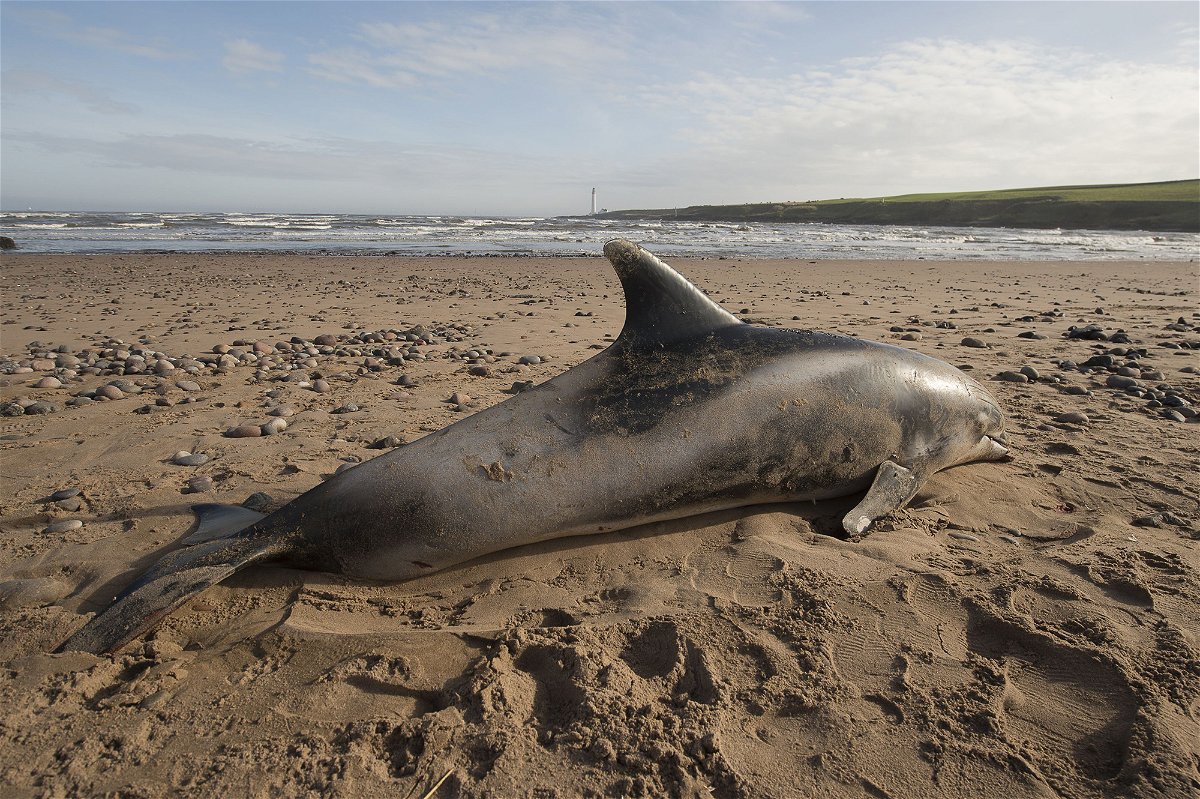Dolphins show hallmarks of Alzheimer’s disease, new study suggests

All the specimens were stranded along the Scottish coast such as this white-beaked dolphin on Montrose Beach.
By Hafsa Khalil, CNN
The brains of three species of dolphin found stranded along the Scottish coast have shown the hallmarks of Alzheimer’s disease, according to new research, providing greater insight into the disease in species other than humans.
The findings may also provide a possible answer to unexplained strandings of dolphins along the coast, researchers said.
Alzheimer’s disease is a common neurodegenerative disorder that mostly affects older humans, with symptoms such as memory loss, forgetfulness and confusion.
According to a study published December 13 in the European Journal of Neuroscience, researchers in Scotland conducted postmortem studies on the brains of 22 odontocetes, or toothed whales, making their findings more detailed compared with others, the authors said.
“It’s more in depth and breadth as it looks at larger numbers of animals from several different species of cetaceans known to be aged for the species (older in age),” Mark Dagleish, coauthor and a senior clinician in anatomic pathology from the University of Glasgow, told CNN on Tuesday.
The study looked at specimens from five species: Risso’s dolphins, long-finned pilot whales, white-beaked dolphins, harbour porpoises and bottlenose dolphins. Of the 22 studied, 18 were aged specimens.
“Critically, (it) examined the whole brains to provide lesion (abnormality) profiles using more markers of Alzheimer’s disease,” Dagleish added, with the same techniques used for human tissues.
Findings showed that three aged dolphins — a long-finned pilot whale, a white-beaked dolphin and a bottlenose dolphin — presented brain changes, or lesions, associated with Alzheimer’s disease in humans.
Tara Spires-Jones, another study coauthor, said in a statement this week that researchers “were fascinated to see brain changes in aged dolphins similar to those in human (aging) and Alzheimer’s disease.”
“Whether these pathological changes contribute to these animals stranding is an interesting and important question for future work,” said Spires-Jones, the personal chair of neurodegeneration at the University of Edinburgh’s Deanery of Biomedical Sciences.
The researchers found that the specimens had accumulated phospho-tau proteins and glial cells, and had formed amyloid-beta plaques, the clumping of a protein found in brains of people with Alzheimer’s disease. The distribution of these lesions was comparable to the brain regions in humans with Alzheimer’s, according to the research paper.
Dagleish said the findings are “the closest anyone has been able to show that any animals develop the Alzheimer’s disease-associated lesions spontaneously,” which had been thought only to develop in humans.
Odontocetes are regularly stranded on UK coasts in groups, which the study authors said may support the “sick-leader” theory of when the group follows an aged leader into shallow waters, potentially as a result of the leader’s confusion.
The similar neuropathology of the aged dolphins and humans with Alzheimer’s suggests that the marine mammals have a susceptibility to the disease, but Dagleish said that a diagnosis can only be made if there are cognitive deficits. These are typically found using cognitive impairment assessments — impossible with postmortem studies.
The-CNN-Wire
™ & © 2023 Cable News Network, Inc., a Warner Bros. Discovery Company. All rights reserved.